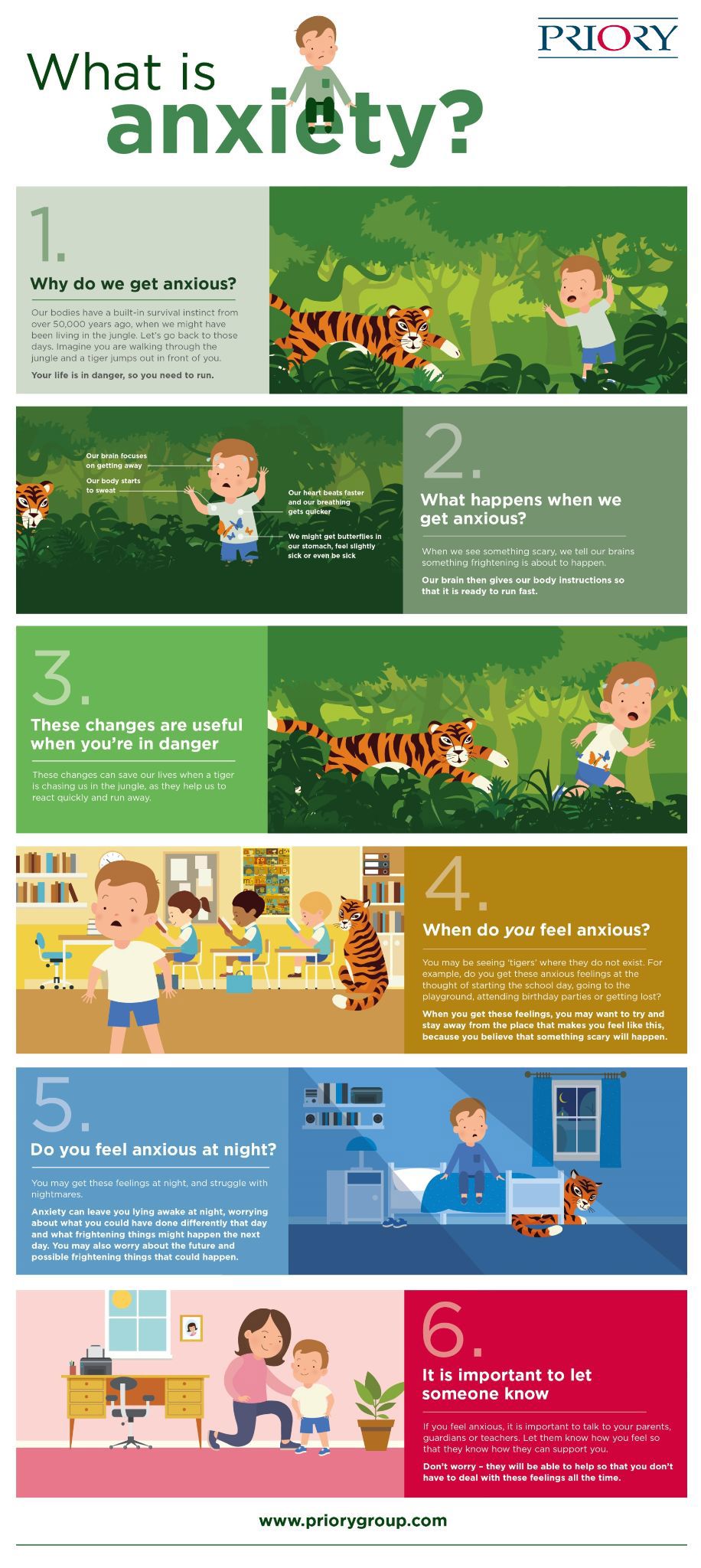Understanding anxiety in children
Learn how anxiety may affect children and how to help them manage their symptoms.
Learn how anxiety may affect children and how to help them manage their symptoms.



Anxiety disorders are among the most common mental health issues seen in children and a child can often feel anxious at different times as they grow up. They may worry about sleeping in the dark and having nightmares, or feel anxious about starting school, doing tests or completing their homework.
In this guide, we'll help you to understand how anxiety starts in a young person, how it may present, and how you can help them manage. We'll also look at how to talk to a child about anxiety to help them get a better understanding of what they're going through.
When we're faced with a threat, our body prepares to react by doing the following:
These changes can save our lives in a life-threatening situation, as they help us to react quickly and run away.
However, anxiety disorders can make children experience all these symptoms when a danger isn’t present. For example, they may get these feelings at the thought of starting the school day, going to the playground or attending birthday parties.
When this happens, they may want to avoid the place or situation that makes them feel like this, as they believe something scary will happen.
Symptoms of anxiety in children can vary, and some children may experience different symptoms compared to others as every child is different. Some children may struggle with mostly physical symptoms of anxiety, whereas others may struggle with psychological symptoms. There are also a lot of children who experience a mixture of symptoms.
Join our expert panel in Perspectives, where we discuss the solutions and causes of the ongoing crisis in young people's mental health. This episode features insight from clinicians and leaders in the charity sector.
Be empathetic towards the child’s feelings. Listen to why they’re anxious, and explain to them that their body is made to protect them against dangers, but that they're seeing dangers where they don't exist. Understanding this can help a child to stay calm when they start to feel the physical symptoms of anxiety.
Let the child know that you think they’ll be fine in a situation they want to avoid. Give them examples of times they've managed well in the past. For example, tell them about the time they went into pre-school knowing no-one but let go of your hand, waved and enjoyed the day.
Give the child lots of evidence against their worry. You'll need to feed this to them as they're likely to block out such evidence when they're anxious, as they pile up their worries instead. For example, when they hear something negative on social media, the news or from a neighbour, show them the other side of the story. People often focus on gossip and bad news, so balance this with good news.
Where possible, don't let a child avoid situations that worry them. If they stop doing something or going somewhere that makes them anxious, they don’t have an opportunity to see that they can actually cope. Their negative connotation of a situation is reinforced and will simply grow as they continue to avoid it.
Fidget toys and tools can be used to help a child struggling with anxiety. They can help when they're feeling anxious or experiencing anxiety symptoms as they can redirect restlessness by giving their fingers something to do. Fidget items can be a great distraction for a child with anxiety and can be used as a lasting technique to help manage their anxiety.
Anxiety disorders are very treatable. The earlier a child receives anxiety treatment, the easier it is to manage and ultimately recover from.
At Priory, as part of our private child and adolescent mental health services (CAMHS), we can offer education about anxiety to a young person and their family, which may be through family therapy. Family therapy can help everyone’s strengths come to the fore to assist the young person to recover and remain well. We can also offer individual therapy to teach the young person skills to manage their worries; this may be in the form of cognitive behavioural therapy (CBT).
Treatment offered by Priory will teach a child helpful skills for life. If they find worries popping up in the future, they'll have a ‘toolbox’ to help them to tackle each concern at a time.
If necessary, we can offer medication prescribed by specialist child and adolescent psychiatrists, who will also help to monitor the young person’s medication, mental health and risks.

